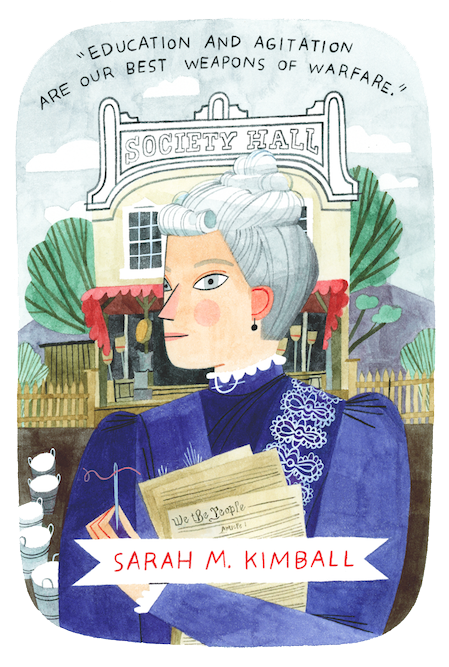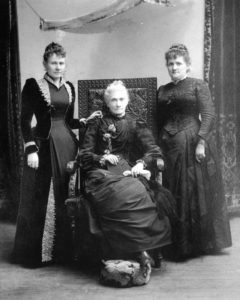
Sarah M. Kimball,
A Woman's Rights Woman
1818–1898
“Education and agitation are our best weapons of warfare.”
–– “Greeting,” Woman’s Exponent 18:18 [15 Feb. 1890]: 139
by Janelle M. Higbee
The inscription on Sarah M. Kimball’s gravestone reads, “Strong-Minded and Warm-Hearted” —a fitting tribute to a woman who spent her life devoted to the cause of women’s rights and to charitable principles.
Her views were formed by wide-ranging life experience. “She said her experience in life had been different from that of many,” one of her colleagues recorded Kimball’s words. “She had moved in all grades of society; had been both rich and poor; had always seen much good and intelligence in woman.” [1]

Sarah M. Kimball. Photo courtesy of Utah State Historical Society
Born in Phelps, New York, Sarah Melissa Granger spent her formative teenage years in the Mormon settlement of Kirtland, Ohio. At age 22 she married Hiram Kimball, and they settled in Nauvoo, Illinois. While in Nauvoo, Kimball organized a charitable sewing society that quickly evolved into the official women’s organization of the LDS Church: the Female Relief Society of Nauvoo. She believed that beginning with the organization of the Relief Society, women worldwide were entering a new sphere of opportunity: “The sure foundations of the suffrage cause,” she wrote, “were deeply and permanently laid on the 17th of March, 1842” (the official date of the Relief Society’s founding). [2]
After driving her own team across the plains to Salt Lake City in 1851, Kimball settled in a small adobe house in what became the Salt Lake Fifteenth Ward, where she was appointed Relief Society president in 1857. She served in that capacity for the next forty years. She was instrumental in re-establishing the Relief Society throughout Utah, working closely with Eliza R. Snow to organize church-wide Relief Society programs.

Sarah M. Kimball. Photo courtesy of Utah State Historical Society
One of her early accomplishments was to erect the church’s first Relief Society Hall, in 1868. It was a two-story building with the first floor housing a cooperative store, and the second floor an assembly hall dedicated “to art and science” as well as weekly Relief Society meetings. The hall also hosted many significant meetings of Salt Lake City women as they organized politically during the 1870s.
Kimball also served in two General Relief Society presidencies; as a member of the territorial committee of the People’s Party, and as a member of the constitutional convention that composed Utah’s (unsuccessful) petition for statehood in 1882. [3]
Kimball was also an early leader in the suffrage movement in Utah. When the territorial legislature granted suffrage to Utah women, Kimball was exultant. The minutes of her ward Relief Society meeting record her reaction on February 19, 1870: “Mrs. Sarah M. Kimball said she had waited patiently a long time, and now that we were granted the right of suffrage, she would openly declare herself a woman’s rights woman, and called upon those who would do so to back her up, whereupon many manifested their approval.” [4]
“Mrs. Sarah M. Kimball said she had waited patiently a long time, and now that we were granted the right of suffrage, she would openly declare herself a woman’s rights woman”
–Salt Lake Fifteenth Ward Relief Society minutes, 19 Feb.1870
In the 1890s, during a national push for universal suffrage, Kimball served as a delegate to the national suffrage association, and as president of the Utah Woman’s Suffrage Association (where she was later voted in as “Honorary President” for life).

(L to R) Emily S. Richards (co-founder of Utah Woman Suffrage Association), Phoebe Beattie, and Sarah M. Kimball. Photo courtesy of Utah State Historical Society
As president of the Utah suffrage association, Kimball wrote of the women’s rights movement, “Many thousands are looking for room to earn their bread and apparel, and asking custom to allow them to choose their husbands, control their persons, and participate with their kinsmen in their highest aspirations for the good of the home, the church, the state, and for humanity….Their noble, emancipated daughters will rise up and call them blessed.” [5]
After Kimball’s death in 1898, her long-time church colleague and fellow suffragist Emmeline B. Wells wrote a tribute describing “President Mrs. Kimball”:
“She was well versed in the literature of the time, and the political questions that have agitated the minds of women much during the nineteenth century period; she was inclined to argument on points of law and political herself particularly well, and never hesitated in giving her opinion upon equality of the sexes. In fact she would rank as a leader in the woman’s movement, and in many respects she resembled the illustrious so called General, Susan B. Anthony.” [6]
Janelle M. Higbee is a writer and editor with specialties including marketing, education, and nineteenth-century Mormon women’s history.
Footnotes
[1] Salt Lake Fifteenth Ward Relief Society minutes, 19 Feb 1870, LDS Church History Library.
[2] Woman’s Exponent 20:81, no. 10 (1 Dec. 1891).
[3] Jill Mulvay Derr, “Sarah M. Kimball,” in Sister Saints, ed. Vicky Burgess Olson, Provo, UT: Brigham Young University Press, 1978: 24.
[4] Salt Lake Fifteenth Ward Relief Society minutes, Feb. 19, 1870, LDS Church History Library.
[5] “Reply to ‘A Man’s Advice about Woman Suffrage,’” Woman’s Exponent v 20. No. 10 (Dec. 1, 1891): 81-82.
[6] “LDS Women of the Past,” Woman’s Exponent (June 1 and 15, 1908): 1-3.

